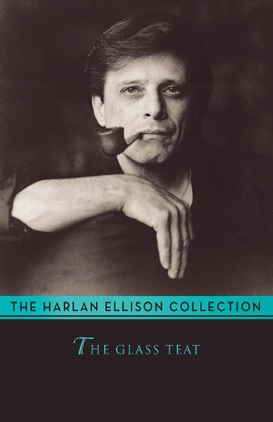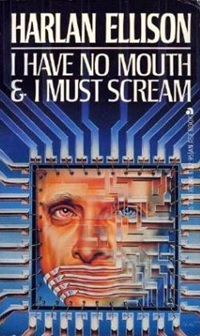Born: May 27, 1934
Died: June 27, 2018
Ohio connection: Birth
Cleveland
Harlan Jay Ellison, speculative fiction writer, novelist, editor, and critic, was born to a Jewish family in Cleveland, Ohio. The son of Louis Laverne and Serita (Rosenthal) Ellison, Ellison was raised in Painesville, Ohio; however, after his father died in 1949, Ellison and his mother returned to Cleveland.
Ellison began writing at an early age with his first published story appearing in The Cleveland News when he was 15 years old. He graduated from East High School and attended Ohio State University.
Ellison was a founding member of the Cleveland Science Fiction Society (1951-1952) and published his writing in its journal, The Bulletin of the Science Fiction Society. Ellison eventually became its editor. Through the journal and fan activities, Ellison met many leading science fiction writers, some of whom encouraged him in his own literary ambitions.
In 1955, Ellison moved to New York City to begin his career as a writer. He was drafted in 1957 and served in the United States Army. In the mid-1950s, Ellison began publishing stories in popular science fiction magazines like Fantastic, Imagination, and Galaxy Science Fiction. He was married five times and was divorced four. His fifth and final marriage was to Susan Toth in 1986. They remained together, living in Los Angeles for 32 years, until Ellison’s death.
In 1962, Ellison moved to California and wrote for the motion picture and television industry. He wrote episodes for many popular shows for television, including The Outer Limits, Route 66, Star Trek, The Man from U.N.C.L.E., The Flying Nun, Babylon 5, and the 1980’s revival of The Twilight Zone. Ellison held various positions while working in television including as a writer, a story editor, a creative consultant, and an actor. Ellison would write what was arguably the most critically acclaimed episode of Star Trek, “The City on the Edge of Forever.” However, the controversy behind who would take credit for the episode would percolate for years.
Ellison wrote short stories, novels, novellas, screenplays, comic book scripts, teleplays, essays, a wide range of criticism covering literature, film, television, and print media. He used many pseudonyms; the most notable, perhaps, is “Cordwainer Bird” which he used as tribute to fellow science fiction writer Paul M. A. Linebarger, who used the pen name “Cordwainer Smith.” Ellison edited anthologies, including the critically acclaimed Dangerous Visions (1967) series and Madea: Harlan’s World (1985). His screenplay credits include The Oscar, His novels include Run for the Stars (1957), The Man with Nine Lives (1960), Doomsman (1967), A Boy and His Dog (1969), and Mefisto in Onyx (1993). His story collections include A Touch of Infinity (1958), Paingod and Other Delusions (1965), Over the Edge (1970), Stalking the Nightmare (1982), Dreams with Sharp Teeth (1991), and Troublemakers (2001). From 1968 until 1970, Ellison wrote about television and related topics in a column called “The Glass Teat” for the Los Angeles Free Press, an underground newspaper. See Wikipedia’s main article: Harlan Ellison bibliography for a full list of Ellison’s writing.
In an award-winning career that spanned 60 years, Ellison authored 100 books and over 1,700 articles and short stories. In its obituary for Ellison, The New York Times called him “a furiously prolific and cantankerous writer whose science fiction and fantasy stories reflected a personality so intense that they often read as if he were punching his manual typewriter keys with his fists.” Intelligent, witty, bold and combative, there’s no doubt that Ellison was renowned for his personality as well as his writing.
Ellison’s last public appearance in his hometown of Cleveland would occur in September 2007 at a showing of the documentary film Dreams with Sharp Teeth at the Cleveland Public Library.
Harlan Jay Ellison died in his home in Los Angeles, California, on June 28, 2018. He was 84 years old.
Works

Awards
Numerous Writers Guild of America Awards, Hugo Awards, Nebula Awards, Science Fiction Writers of America Awards, Nova Awards, Locus Awards, Jupiter Awards, Instructors of Science Fiction in Higher Education, six Bram Stoker Awards, Horror Writers of America, Edgar Allan Poe Awards, PEN International Silver Pen award for journalism, World Fantasy Awards. His works have been named in the major works of American literature by Encyclopedia Americana Annualand inducted into the Swedish National Encyclopedia, and included in the Best American Short Stories. Milford Award for lifetime achievement in editing; Bradbury Award, Science Fiction and Fantasy Writers of America, 2000; Special Committee Hugo Award, 2006. See the list of awards Harlan Ellison received in recognition of his published works.
Additional Resources
Wikipedia Article: Harlan Ellison



